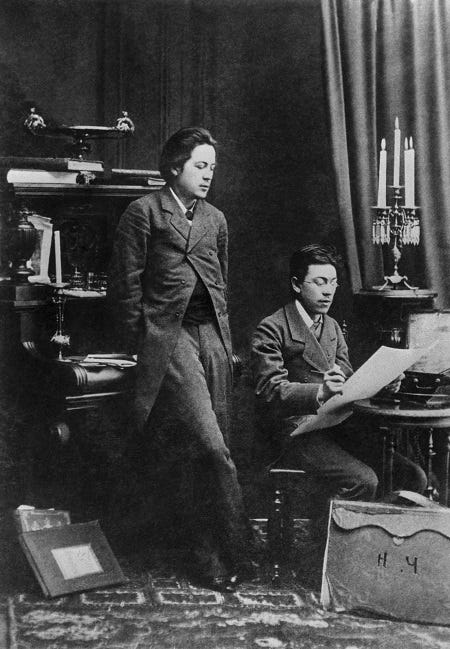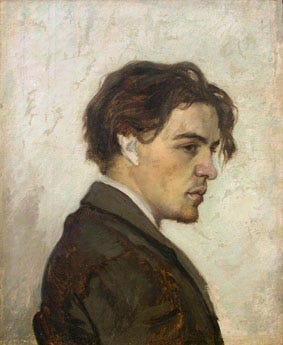Traits of cultured people, by Anton Chekhov
“your talent puts you in a special position: if you were a toad or a tarantula, even then you would be respected, as everything is forgiven to a talent.“
Today I want to present you with another translation, also Chekhov, but this time it's one of his letters.
Anton Pavlovich was only 26 when he wrote this emotional and frank letter to his almost 28-year old brother, a talented artist but a weak-willed man who at that time was wallowing in self-pity and hurting himself and his friends and relatives. Anton Pavlovich knew all of Nikolai's weaknesses, was worried about him and upset by his brother's neglect of his talent. He said once: "A great Russian talent is perishing, perishing for nothing."
Please enjoy the letter and the richness of the footnotes.
From Anton Pavlovich Chekhov to Nikolai Pavlovich Chekhov
March 1886, Moscow
My young Zabelin1! I have been informed that you have been offended by my and Schechtel's2 mockery... Only noble souls have the capacity to be offended, but still if you can mock Ivanenko, me, Mishka and Nella, why can't you be mocked? It's not fair... However, if you're not kidding and really feel offended, I hasten to apologise.
One only makes fun of what's funny or what the one doesn't understand... Choose one or the other.
The latter, of course, is more flattering, but – alas! – for me personally, you are no mystery. It isn't hard to understand a man with whom you shared the sweet delights of childhood3, beech forests4, Latin classes, and, finally, our life in Moscow. And besides, your life is something so psychologically simple that it is understandable even to people who haven't been to seminary. Out of respect, I'll be frank with you. You are angry, offended... but the reason is neither the mockery nor placidly chattering Dolgov5... the reason is that you, as a decent man, feel yourself on a false ground; and whoever imagines himself guilty always seeks an external justification for himself: a drunkard attributes everything to woe, Putyata blames censorship, an individual running away from Yakimanka6 to pursue fornication, referring to the cold rooms, the mockery and so on... If I were to leave my family to the mercy of fate now, I would have tried to find excuses for myself in my mother's character, my blood-spitting7 and so forth. It is natural and excusable. Such is human nature. And that fact you feel yourself on a false ground is also true, otherwise, I wouldn't have called you a decent man. If you lose your decency, well then it's different: you reconcile and stop sensing the falsity...
The fact that you are no mystery to me and sometimes are barbariously funny is also true. After all, you're a mere mortal, and all of us, mortals, are only mysterious when we're stupid and funny for 48 weeks of the year... Aren't we?
You often complained to me that "no one understands me!!"8. Even Goethe and Newton didn't complain about that... Only Christ complained but he was talking not about his ego but his teaching... You are perfectly understood... But if you can't understand yourself, don't say it's others' fault.
I assure you that, as a brother and a person close to you, I understand you and empathise with you wholeheartedly... . I know all your good qualities like the back of my hand, I appreciate them and treat them with the utmost respect. I may even list them, if you wish, as proof of my understanding of you. In my opinion, you are kind to the point of being naive, generous, not an egoist, ready to share your last kopeck, sincere; you are devoid of envy and hatred, ingenuous, you are compassionate towards people and animals, not snide, not vindictive, trusting... You are gifted from above in a way that others are not: you have a talent. This talent puts you above millions of people, as there is only one artist per two million people on earth... Your talent puts you in a special position: if you were a toad or a tarantula, even then you would be respected, as everything is forgiven to a talent.
You have only one flaw. It is your false ground, your grief and your intestinal catarrh. It is your utter discourtesy. Pardon me, but veritas magis amicitiae9... The point is, life has its terms... In order to feel at ease in an intellectual company, not to be a stranger in its ranks and not to be burdened by it, one has to be cultured in a certain way... Talent has brought you into this environment, you belong to it, but... you are drawn away from it, and you have to balance between the cultured public and all your vis-à-vis10. It's your bourgeois background, raised by birching, having the Rhenish beer cellar, all being given to you. It's difficult to overcome, terribly difficult.
The cultured people, in my opinion, should meet the following requirements:
1) They respect the human personality, so they are always lenient, gentle, polite, accommodating... They do not revolt because of a hammer or a missing rubber; when they live with someone, they do not make a favour of it, and when they leave, they do not say “nobody can live with you!” They forgive the noise, the cold, the overcooked meat, the witticisms, and the presence of strangers in their dwelling...
2) They have compassion for more than just beggars and stray cats. They also feel sorrow for things that cannot be seen by the naked eye. So, for example, if Peter knows that his father and mother are greying with ennui and stay up nights because they rarely see Peter (and if they do, they see him drunk), he will hurry to them and damn the vodka. They stay up nights to help the Polevayevs11, pay for their student brothers and clothe their mother.
3) They respect other people's property and therefore pay their debts.
4) They are pure-hearted and fear lies like fire. They do not lie even about trifles. Lying is offensive to the listener and denigrates the speaker in his eyes. They do not pose, they behave in public as they do at home, they do not puff up the dust in the eyes of the younger brethren... They are not chatty and do not blabber on when they are not asked... Out of respect for others' ears, they are rather silent.
5) They do not humiliate themselves for the purpose of arousing sympathy in another. They do not play on the strings of other people's souls to be pitied and coddled in return. They do not say, " I am misunderstood!" or, "I have been treated unfairly! I... !", because all this is striving after cheap effect, vulgar, corny, fake...
6) They are not fussy. They are not bothered by false diamonds such as celebrity acquaintances, the handshake of a drunken Plevako12, the rapture of a stranger in Salon, fame across porterhouses... They laugh at the phrase: "I am a representative of the press!", which only the Rodziewiczs and the Levenbergs13 would suit. Doing a kopeck’s worth of good work, they don't make a hundred-ruble fuss out of it and boast that they have been let in where no one else has... True talents always remain in obscurity, in the crowd, away from the show... Even Krylov said that an empty barrel makes more noise than a full one...
7) If they do have a talent, they respect it. They don't sacrifice it for calm, women, wine, hustle... They are proud of their talent. Thus, they do not get drunk with guards of the bourgeois school nor with Skvortsov's guests, knowing that they are not called to associate with them, but to culturally influence them. Besides, they are fastidious...
8) They develop aesthetics in themselves. They cannot fall asleep with clothes on, tolerate cracks with bedbugs in the wall, breathe crappy air, walk on a spattered floor, eat from a paraffin lamp. They try to tame and ennoble their sexual instinct as much as possible...
The cultured, on the other hand, are not so cheap in this respect. What they want from a woman is not a pleasure in bed, sweat and tears... not cleverness in the form of the ability to fake pregnancy and to lie relentlessly... The cultured, especially artists, need freshness, grace, humanity, the ability not to be a... but a mother... They do not casually indulge in vodka or snuff because they know that they are no swine. They drink only when they are free, on occasion... They know they need mens sana in corpore sano14.
And so forth. Such are the cultured... It is not enough to read Pickwick and memorise a monologue from Faust in order to educate oneself to the level of the milieu in which one finds oneself. It is not enough to take a cab and go to Yakimanka to flee a week later...
A ride to Yakimanka and back won't help. You have to have the courage to screw everything and take a sudden turnaround... Come to us, smash the vodka decanter and lie down to read a book... at least Turgenev, whom you haven't read...
... ...you should drop your ego because you're not a kid... 30 years old! It's time!
I'm waiting... We're all waiting...
Yours,
A. Chekhov
An allusion to Nikolai's addiction to alcohol; this surname belonged to a landowner from Zvenigorod, an alcoholic, the prototype of Bortsov in Chekhov's play On The Road (1885), which is a remake of the story Autumn (1883).
Fyodor Osipovich Schechtel was a famous Russian architect, a friend of Anton Pavlovich Chekhov. At the beginning of the 1880s, Schechtel involved Nikolai Pavlovich Chekhov in the construction and design of the Antaeus theatre. But after a fee was paid to Nikolai, he disappeared. He used to do that often. Later, he appeared, asked for additional money and disappeared again. "I'm tearing my hair and teeth out of despair: Nikolai is gone and has covered every trace of himself," Schechtel wrote to Anton Chekhov at the time (which probably was one of the catalysts for the translated letter). "What to do? Help me on your part, too, and once he shows up, make him understand that, having made a commitment, he must at some point fulfil it <...>. I'm going on a search again today, perhaps I'll have more luck..."
Instead of “sweet delights of childhood” the original sentence mentions "sweetness of tatar hats", which I couldn't accurately understand. Perhaps, it’s literal. Perhaps, it refers to tatarenhut, which is a cooking device for fondue. Perhaps, it’s something else.
Beech forests are common near Taganrog, a city in the south of Russia where all Chekhov brothers were raised.
Dolgov Nyctopoleon Vasilievich - pianist, an acquaintance of the Chekhov family.
Yakimanka is a street in Moscow where А. Chekhov lived, and where often his promiscuous brother "took a breather" in between his benders.
From 1884 Chekhov was suffering from a bleeding right lung.
The author’s punctuation is preserved here for emphasis.
Truth is above friendship, from Latin.
Meaning Nikolai's neighbours or acquaintances, supposedly people having dissolute life and influencing Nikolai negatively.
The Polevayevs were a family reported by M.P. Chekhov to have played a negative role in the lives of Nikolai and Alexander Chekhov.
Fyodor Nikiforovich Plevako (1843-1908) was a famous Moscow lawyer.
Rodziewicz and Levenberg were some petty journalists.
In healthy body, a healthy spirit, from Latin





..just to say that I'm so happy to encounter somebody else who loves Chekhov, profoundly
"Happy" isn't the right word, but. The right word escapes me, currently
This is beautiful and inspiring. Thank you.